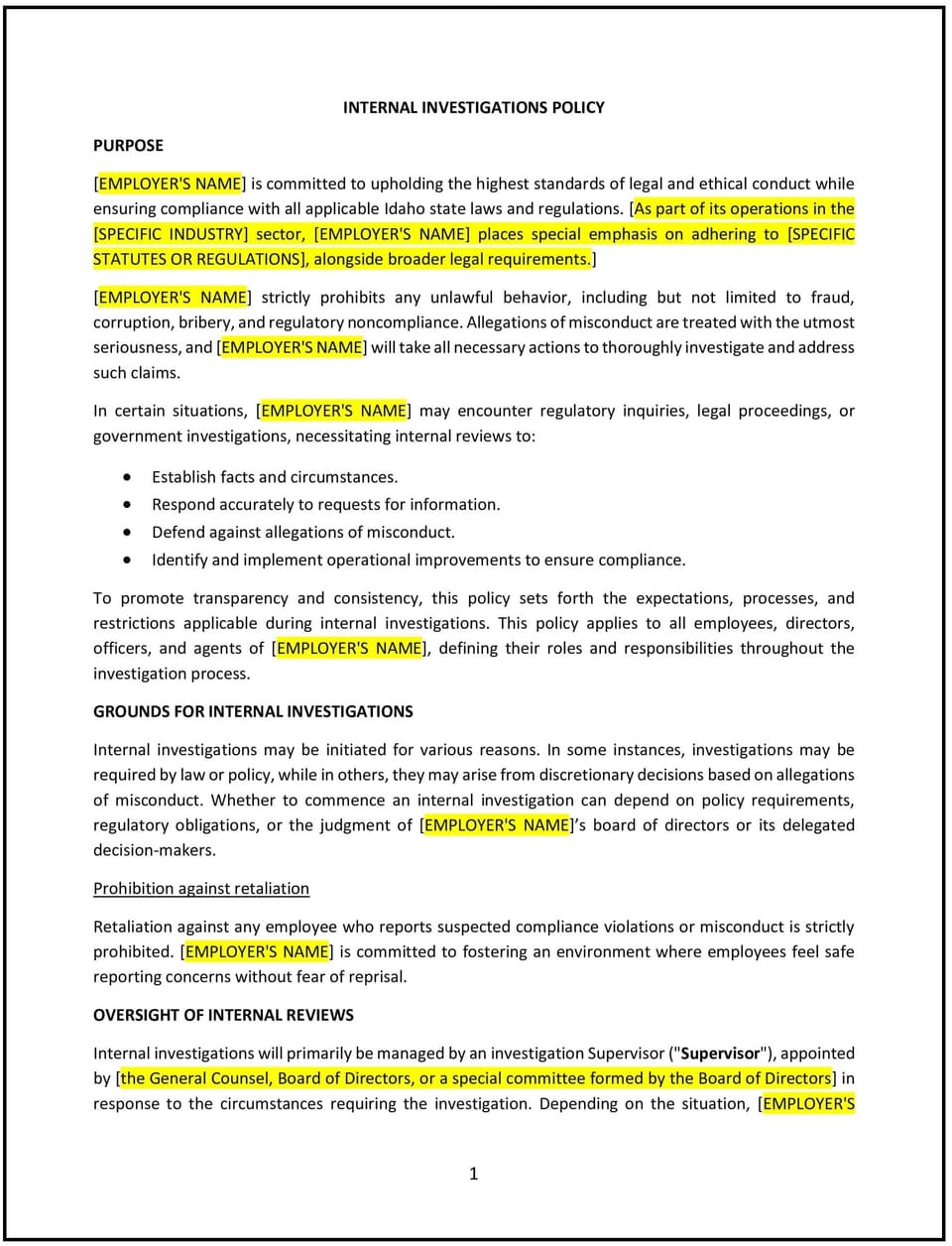Internal investigations policy (Idaho): Free template

Internal investigations policy (Idaho)
An internal investigations policy helps Idaho businesses establish guidelines for conducting fair, thorough, and impartial investigations into workplace concerns, such as misconduct, policy violations, or legal issues. This policy outlines the procedures for initiating, conducting, and resolving investigations while protecting the rights of all parties involved. It reflects the business’s commitment to transparency, accountability, and maintaining a respectful work environment.
By implementing this policy, businesses can address workplace issues effectively, reduce risks, and foster trust among employees.
How to use this internal investigations policy (Idaho)
- Define scope: Specify the types of issues that warrant an internal investigation, such as harassment, discrimination, theft, or policy violations.
- Establish investigation procedures: Outline the steps for conducting investigations, including gathering evidence, interviewing witnesses, and documenting findings.
- Assign responsibilities: Designate qualified individuals or teams to lead investigations, ensuring they are impartial and trained in investigation techniques.
- Protect confidentiality: Emphasize the importance of maintaining confidentiality during investigations to protect the privacy of all parties involved.
- Ensure fairness: Provide guidelines for conducting investigations in a fair and unbiased manner, including giving all parties an opportunity to respond to allegations.
- Communicate outcomes: Describe how investigation findings will be communicated to relevant parties and what actions will be taken based on the results.
- Review and update: Regularly review the policy to ensure it remains aligned with business needs, legal requirements, and best practices.
Benefits of using this internal investigations policy (Idaho)
This policy provides numerous benefits for Idaho businesses:
- Promotes transparency: Clear investigation procedures ensure that workplace issues are addressed openly and fairly.
- Reduces risks: Thorough investigations help identify and resolve issues before they escalate into legal or reputational problems.
- Builds trust: Employees feel more secure knowing that concerns will be investigated impartially and confidentially.
- Encourages accountability: The policy holds employees and leadership accountable for their actions and ensures consistent handling of workplace issues.
- Supports compliance: The policy helps businesses align with federal and Idaho laws regarding workplace investigations.
- Enhances workplace culture: A fair and transparent investigation process fosters a respectful and inclusive work environment.
- Improves decision-making: Investigation findings provide valuable insights for addressing systemic issues and improving workplace policies.
Tips for using this internal investigations policy (Idaho)
- Communicate the policy effectively: Share the policy with employees during onboarding, training sessions, and through internal communications to ensure awareness.
- Train investigators: Provide training for designated investigators on conducting fair, thorough, and impartial investigations.
- Document everything: Maintain detailed records of investigations, including evidence, interviews, and findings, to ensure transparency and accountability.
- Protect confidentiality: Ensure that all investigation-related information is kept confidential and shared only with those who need to know.
- Address retaliation: Prohibit retaliation against employees who report concerns or participate in investigations, and enforce consequences for violations.
- Review the policy regularly: Update the policy as needed to reflect changes in business needs, legal requirements, or best practices.
- Lead by example: Encourage leadership to model a commitment to fairness and transparency in handling workplace issues.
Q: Why should Idaho businesses have an internal investigations policy?
A: An internal investigations policy helps businesses address workplace concerns fairly, reduce risks, and foster trust among employees.
Q: What types of issues should be investigated?
A: Issues such as harassment, discrimination, theft, policy violations, or other misconduct should be investigated, as outlined in the policy.
Q: Who should conduct internal investigations?
A: Businesses should designate qualified individuals or teams to lead investigations, ensuring they are impartial and trained in investigation techniques.
Q: How should confidentiality be maintained during investigations?
A: Businesses should limit access to investigation-related information and share details only with those who need to know, as outlined in the policy.
Q: What happens after an investigation is completed?
A: Investigation findings should be communicated to relevant parties, and appropriate actions should be taken based on the results, as outlined in the policy.
Q: How can employees report concerns or participate in investigations?
A: Employees should follow the reporting procedures outlined in the policy, including contacting a designated representative or using confidential channels.
Q: How often should the policy be reviewed?
A: The policy should be reviewed annually or as needed to reflect changes in business needs, legal requirements, or best practices.
This article contains general legal information and does not contain legal advice. Cobrief is not a law firm or a substitute for an attorney or law firm. The law is complex and changes often. For legal advice, please ask a lawyer.


